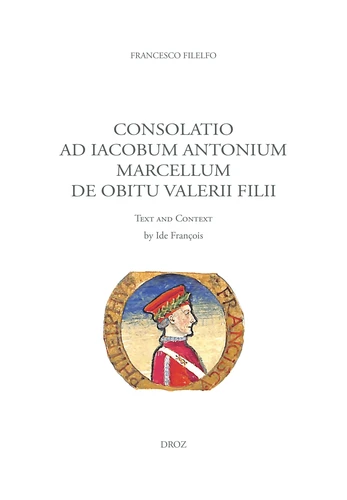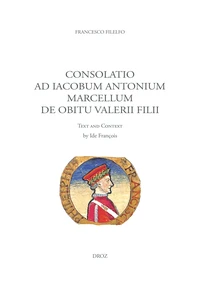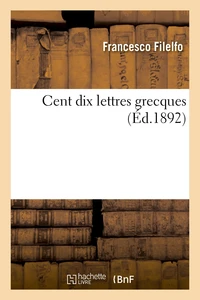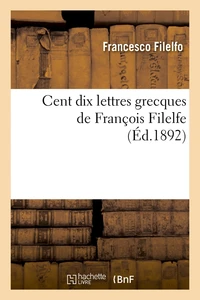Consolatio ad Iacobum Antonium Marcellum de obitu Valerii filii. Text and Context
Par :Formats :
- Paiement en ligne :
- Livraison à domicile ou en point Mondial Relay entre le 14 août et le 29 aoûtCet article sera commandé chez un fournisseur et vous sera expédié 2 à 4 semaines après la date de votre commande.
- Retrait Click and Collect en magasin gratuit
- Livraison à domicile ou en point Mondial Relay entre le 14 août et le 29 août
- Nombre de pages448
- PrésentationBroché
- FormatGrand Format
- Poids1.017 kg
- Dimensions17,2 cm × 24,8 cm × 0,0 cm
- ISBN978-2-600-06428-6
- EAN9782600064286
- Date de parution28/11/2023
- CollectionTravaux d'Humanisme et Renai
- ÉditeurDroz
Résumé
Upon the death of Jacopo Antonio Marcello's eight-year-old son Valerio on the first of January 1461, prominent humanists produced consoling letters, essays, and poems. The most important of these writings was the Consolatio ad Iacobum Antonium Marcellum de obitu Valerii filii, written by the Italian humanist Francesco Filelfo (1398-1481). In his Consolatio, Filelfo displays an ambitious synthesis of Greek, Roman, and Christian consolatory themes and combines panegyrics on the boy and his father with a philosophical exposition on the immortality of the soul.
The present volume offers the first modern edition and in-depth study of this remarkable literary work. It is in two parts : first, the critical edition and facing English translation of Filelfo's Consolatio ; second, four chapters, which explore the historical context of the Consolatio, its place in the genre of consolation, and its philosophical and rhetorical dimensions.
The present volume offers the first modern edition and in-depth study of this remarkable literary work. It is in two parts : first, the critical edition and facing English translation of Filelfo's Consolatio ; second, four chapters, which explore the historical context of the Consolatio, its place in the genre of consolation, and its philosophical and rhetorical dimensions.
Upon the death of Jacopo Antonio Marcello's eight-year-old son Valerio on the first of January 1461, prominent humanists produced consoling letters, essays, and poems. The most important of these writings was the Consolatio ad Iacobum Antonium Marcellum de obitu Valerii filii, written by the Italian humanist Francesco Filelfo (1398-1481). In his Consolatio, Filelfo displays an ambitious synthesis of Greek, Roman, and Christian consolatory themes and combines panegyrics on the boy and his father with a philosophical exposition on the immortality of the soul.
The present volume offers the first modern edition and in-depth study of this remarkable literary work. It is in two parts : first, the critical edition and facing English translation of Filelfo's Consolatio ; second, four chapters, which explore the historical context of the Consolatio, its place in the genre of consolation, and its philosophical and rhetorical dimensions.
The present volume offers the first modern edition and in-depth study of this remarkable literary work. It is in two parts : first, the critical edition and facing English translation of Filelfo's Consolatio ; second, four chapters, which explore the historical context of the Consolatio, its place in the genre of consolation, and its philosophical and rhetorical dimensions.






